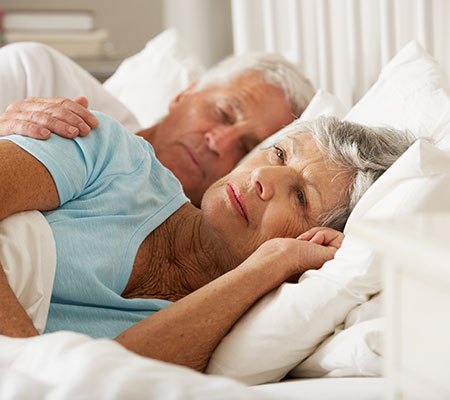
Sleep loss is a common side effect of cancer treatments, but there are many things you can do to get a good night’s rest.
Sleep is an important part of our health, but cancer and its treatments can make it hard for some patients to get a good night’s rest.
Dr. Michael Husak, Marshfield Clinic oncologist and hematologist, said that most sleep problems associated with cancer are related to treatments and medications.
Steroids and narcotics alter energy
Husak points to steroids and narcotics as the leading medications related to sleep loss in cancer survivors.
Steroids are typically prescribed while undergoing chemotherapy, but one side effect of steroids is being hyperactive.
“Most people who are on steroids have a lot of energy,” said Husak. He recommends patients take steroids in the morning so the energy wares off during the day.
Narcotics, which are used as pain relievers, have the opposite effect and may make you tired and disrupt your sleep pattern.
“When people are on narcotics, it interferes with their whole schedule. They are not as active during the day and may find it harder to sleep at night,” he said.
Other causes of sleep loss
“We give very powerful drugs that enter into the central nervous system, so chemotherapy can also affect sleep,” Husak said.
A total of 10-20 percent of chemotherapy drugs will have side effects that relate to sleep.
Those diagnosed with cancer also can develop anxiety, stress and depression, which can negatively affect sleep.
“If people get a diagnosis with cancer, they can sometimes develop situational depression and have trouble sleeping,” Husak said.
Helping with sleep
While there are many things that can help with sleep, Dr. Jaime Boero, a sleep medicine physician at Marshfield Clinic, feels keeping a routine is the most important thing for falling asleep.
This includes slowing down three to four hours before bedtime and eating your final meal before that slow down period begins.
Finding a way to deal with the stress of cancer also can help with sleeping, whether that is meditation, exercise or counseling.
“Stress will wake you up in the middle of the night,” Boero said. “If you don’t face conflicts during the day, you will wake up at 3 a.m. and face them.”
If these things don’t work, Husak said he may still prescribe sleep medication.
Trouble with sleeping can last up to a year after cancer treatments have stopped. If you have problems with sleeping post cancer treatment, talk with your provider.
Related Shine365 posts:
Health effects of sleep deprivation add up
Tired after a full night’s sleep? 3 reasons why

